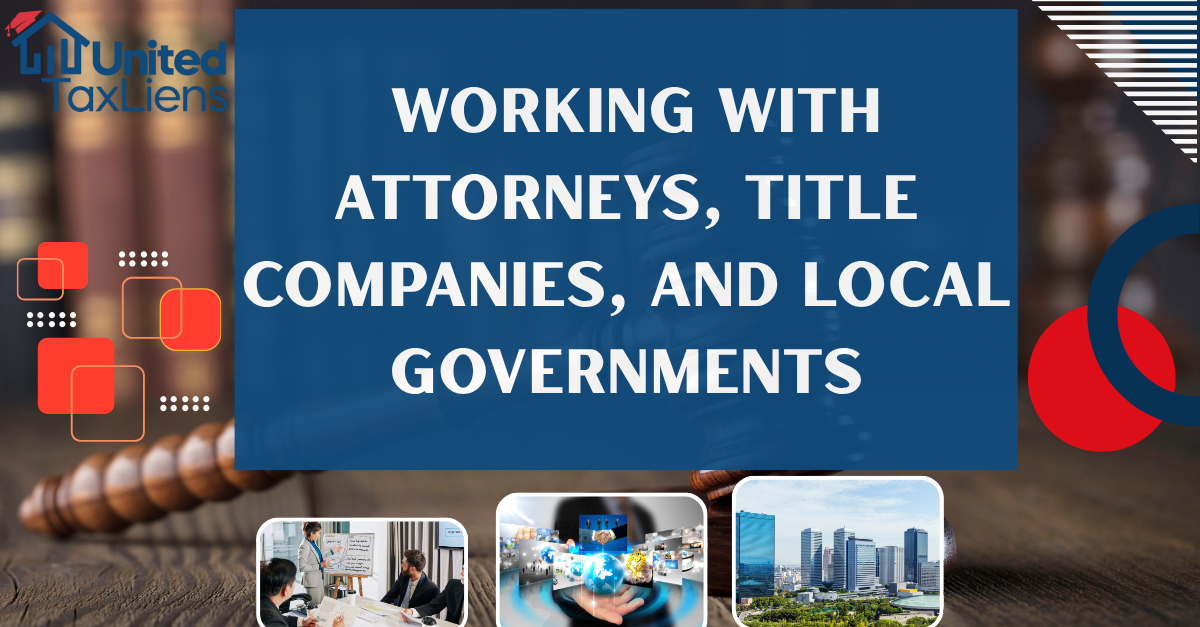Here's something that might surprise you about successful tax lien investors: they rarely go it alone. Sure, you could try to navigate every legal requirement, title issue, and government process by yourself. But why would you want to when there are professionals whose entire job is knowing this stuff inside and out?
Think of it like this—you wouldn't rewire your house without an electrician, right? Tax lien investing has its own set of specialists, and knowing when and how to work with them can be the difference between smooth sailing and expensive headaches.
Your Legal Eagle: Why Attorneys Matter More Than You Think
Let's start with attorneys, because this is where things can get real complicated, real fast. If you end up in foreclosure proceedings (which might happen if a lien doesn't get redeemed), you're entering legal territory that has very specific rules.
And here's the kicker—these rules vary dramatically from state to state. What works in Florida might be completely wrong in Ohio. Miss a step or file something incorrectly? You could be looking at delays, additional costs, or even losing your rights to the property.
The attorneys who work in this space have seen it all. They know the local judges, understand the quirky procedural requirements, and can spot potential problems before they become expensive problems. Think of them as your insurance policy against legal surprises.
Many experienced investors we've talked to say they'd rather pay for an attorney upfront than deal with the mess of trying to fix legal mistakes later. Smart thinking.
Title Companies: Your Window Into What You're Really Getting
Now, about title companies—this is where you find out what you're actually getting yourself into. Because here's the thing: when you buy a tax lien, you're not necessarily getting a clean slate.
Sure, tax lien foreclosures can wipe out many junior liens, but some debts are like that one party guest who just won't leave. IRS liens? They might stick around. HOA fees? Those could be waiting for you too. Utility liens? Yep, sometimes those survive as well.
A good title company acts like a detective, digging through records to give you the full picture. They'll tell you about that mechanics' lien from 2019, the utility bill that's been building interest, or the HOA assessment that nobody mentioned at the auction.
It's like getting a full medical exam before buying health insurance—you want to know what you're dealing with before you commit your money.
Your Local Government Allies (Yes, Really!)
Here's where it gets interesting. Those folks working at the county tax collector's office, the clerk's office, or managing the auctions? They're not your enemies—they can actually be incredibly valuable allies.
Think about it: they see every tax lien that comes through their system. They know which properties tend to redeem quickly, which ones sit for years, and which areas are heating up or cooling down. They also know when rules change, when auction dates shift, or when new procedures get implemented.
Building genuine relationships with these folks isn't about schmoozing—it's about showing respect for their expertise and being someone they're happy to help when you have questions.
Some investors make it a point to learn the names of the key people in each county where they invest. Not because they're trying to get special treatment, but because when questions arise or clarification is needed, having established professional relationships can make the process smoother and more efficient.
The ROI of Professional Help and Building Your Network
Now, some might be thinking, “All these professionals sound expensive.” And yes, working with attorneys, title companies, and maintaining relationships often requires time and money.
But here's how many successful investors tend to look at it: professional help isn't necessarily an expense—it's potentially an investment in avoiding much bigger expenses down the road.
A few hundred dollars for a title search might save someone from discovering a significant IRS lien later. An attorney's fee for handling foreclosure properly could prevent months of delays and legal complications. The time spent building relationships with local government officials might provide insights that help with better investment decisions.
So how does one start building this network? Most investors suggest starting with research and referrals. It may be worth finding out which attorneys in the area actually work with tax lien investors regularly—not all of them do. Consider asking other investors which title companies they trust and why.
When it comes to local government relationships, many find success by being the investor who shows up prepared, asks intelligent questions, and follows the rules. Being professional, respectful, and someone officials feel comfortable working with often helps.
Remember, these relationships often develop over time. The goal isn't to become best friends overnight—it's building professional relationships based on mutual respect and competence.
The Reality Check
Here's the honest truth: tax lien investing involves enough moving parts that trying to handle everything alone can be challenging. The investors who seem to thrive long-term are typically those who understand their own strengths and limitations, then build teams to fill in the gaps.
However, every situation is different, and what works for one investor may not be appropriate for another. Consider talking with a coach or mentor to help decide who might be worth consulting for guidance on specific deals or situations. They can help determine which professionals might be most valuable for particular circumstances and investment goals.
Many successful investors focus on what they do best—finding good opportunities and making smart investment decisions—while letting professionals handle what they do best.
This blog is for informational purposes only and should not be relied upon as financial or investment advice. Real estate investing carries risks, and individual results will vary. Always consult with your team of professionals before making investment decisions. The authors and distributors of this material are not liable for any losses or damages that may occur as a result of relying on this information.



